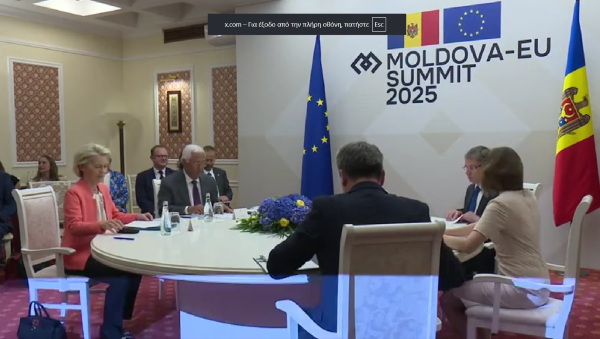Ahead of Moldova’s parliamentary election on 28 September, the EU and Moldova organised the first Moldova-EU Summit in Chișinău on 4 July to highlight support for the country’s EU accession process. Moldova was granted EU candidate status in 2022.
The ruling pro-EU Action and Solidarity Party (PAS) of President Maia Sandu is under constant attacks – spread of disinformation, foreign interference and hybrid threats – orchestrated by the Kremlin and parties openly defending Russia’s positions.
A new pro-EU government, led by PAS, following the September elections, will move the country closer to full membership by 2030.
However, while Moldova meets the conditions, EU leaders have not taken the most crucial step towards Moldova’s accession, the fundamental cluster.
“We look forward to the next steps in Moldova’s accession process, opening negotiating clusters, starting with the fundamental cluster as soon as possible when the conditions are met,” the leaders declared in their joint statement on 4 July.
The people of Moldova expressed their support for EU membership in last year’s Referendum, which resulted in the inclusion of EU accession in the Constitution of Moldova. Nevertheless, any delay in the accession process works in favour of anti-EU and pro-Russian forces, which intensify disinformation campaigns and depict Moldova’s accession as a national catastrophe.
Despite PAS leading the opinion polls, an anti-EU front is meticulously working to undermine the September democratic elections using all possible tools, including large-scale electoral corruption and information manipulation.
According to a survey conducted by iData between May 17 and 24, PAS is expected to win 46 seats in the parliament. However, the results could prevent the party from forming a parliamentary majority.
Four pro-Russian parties could block the creation of a pro-EU government, potentially leading the country to destabilisation.
The Party of Socialists of the Republic of Moldova (PSRM), led by former Moldovan President Igor Dodon, comes second according to the poll and may obtain up to 19 seats. PSRM is a nationalist and socially conservative party, expressing anti-NATO and anti-EU views. It is also against LGBT rights and supports Russia’s invasion of Ukraine.
The poll indicates that the Victory Bloc, founded by the fugitive oligarch Ilan Șor in Moscow in April 2024, could come third and elect 18 members of parliament.
A minor alliance, the “Alternativa” Bloc, founded in 2025 by Chișinău Mayor Ion Ceban and 2024 presidential candidate Alexandr Stoianoglo, could secure 12 seats. Despite declaring pro-EU, the alliance is broadly accused of Russophilia.
Additionally, Partidul Nostru, the party of 2024 presidential candidate Renato Usatîi, could win six seats.
High polarisation could prevent several other parties from entering the parliament, including the Party of Communists of the Republic of Moldova, which was once a powerful party. The poll indicates that these parties would not pass the electoral threshold of 5%.
However, the poll also found that 23.1% of respondents hadn’t decided yet who they would vote for. As foreign influence, political election corruption and disinformation intensify, this part of the population is the main target of pro-Russian and anti-EU parties in their campaigns.
During the Moldova Summit, European Commission President Ursula von der Leyen pledged that the EU would assist Moldova in defending itself against hybrid threats posed by “agents of autocracy.”
“We have signed a Security & Defence partnership. We are also committed to protecting you against the hybrid attacks and energy shocks that your country has been victim of,“ said EC President.
She highlighted that behind those attacks are the same agents of autocracy trying to undermine European democracies.
The Commission’s President announced that the EU is connecting Moldova to the EU electricity market, ensuring stable flows, and announced the release of the first €270 million under the Moldova Growth Plan.
“You have delivered on reforms, and so we deliver on promised support. And with an overall envelope of € 1.9 billion, more will come. This will support your competitiveness and bring concrete benefits to your people. Then by October, your integration into the Single Euro Payments Area will be complete. We call it SEPA. That means faster, cheaper, and safer transfers of euro – and that is more opportunities for your businesses and for your people,“ emphasised Ursula von der Leyen.
No doubt, these are significant acts of support for Moldova and its citizens. However, more concrete efforts to help Moldovan democracy be more resilient to all attempts undermining its independence, democracy and freedoms are critical ahead of the September elections. Moldova remains a top target for Russia!
